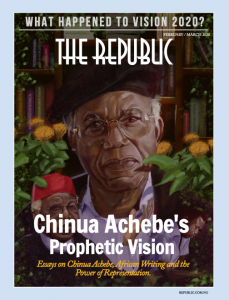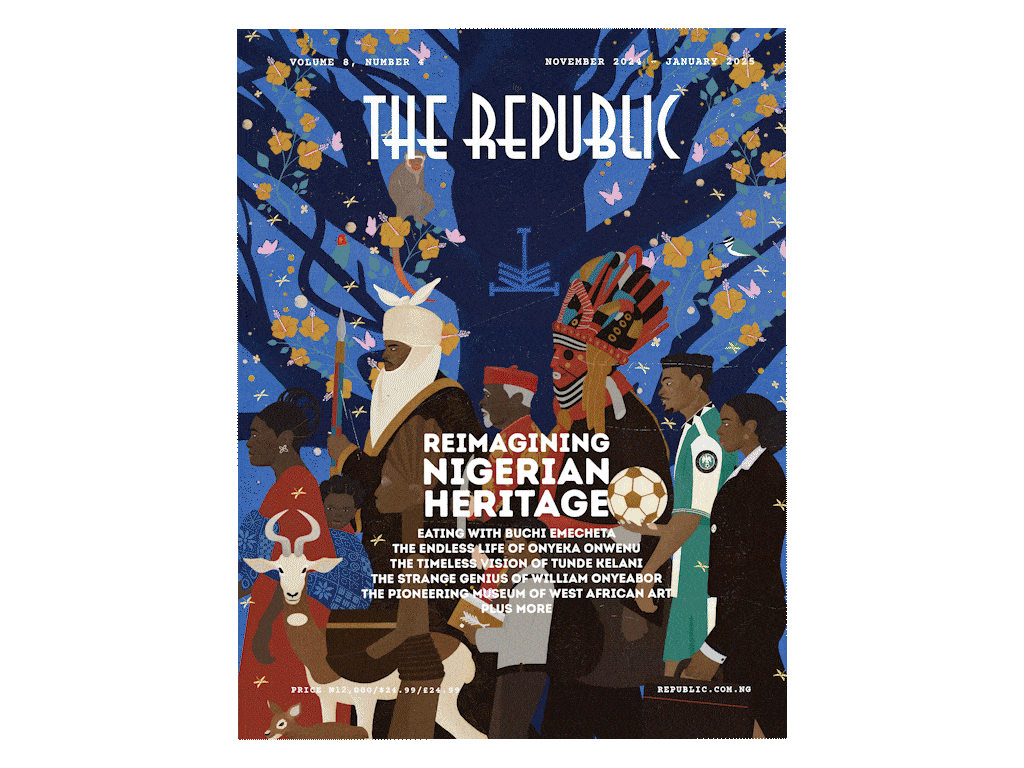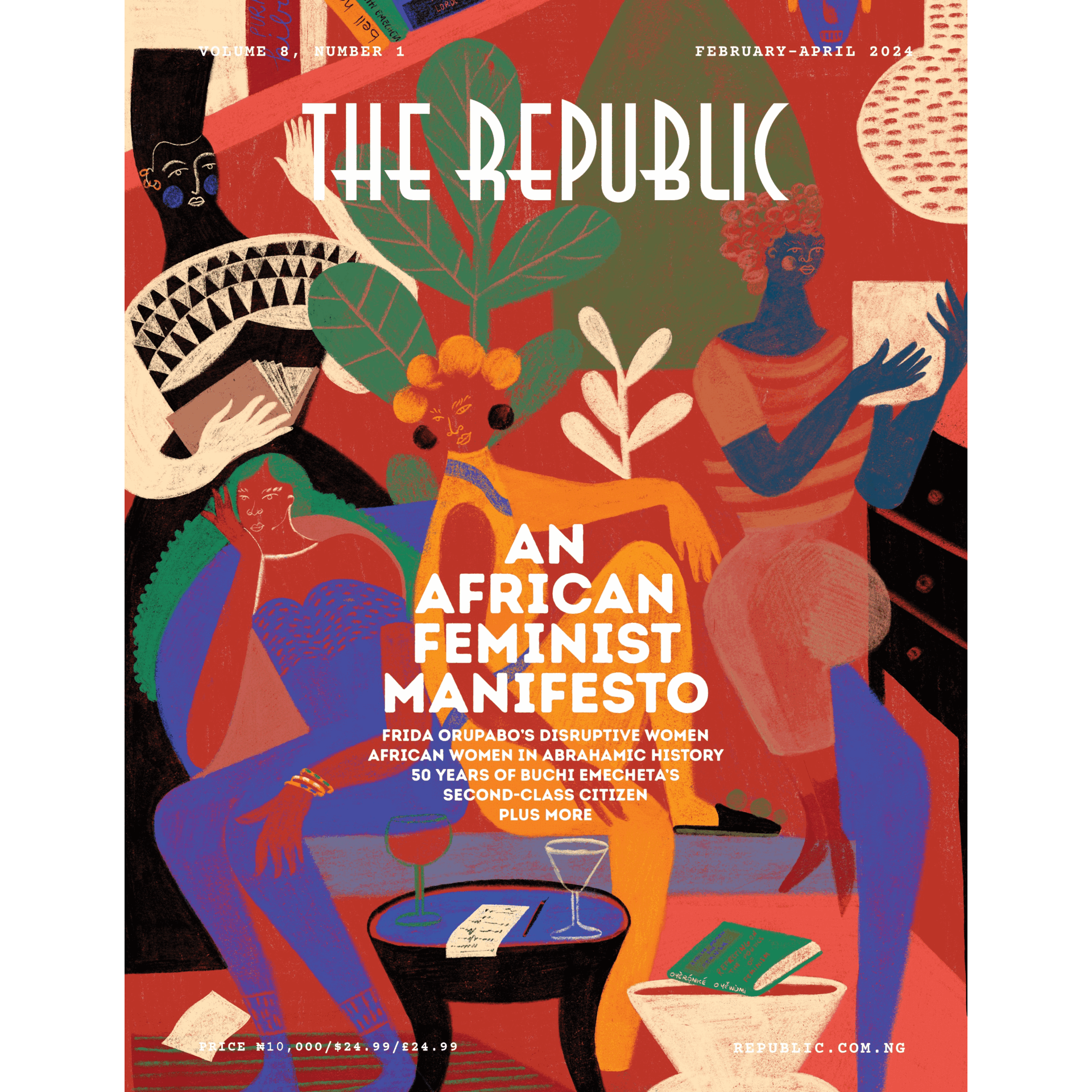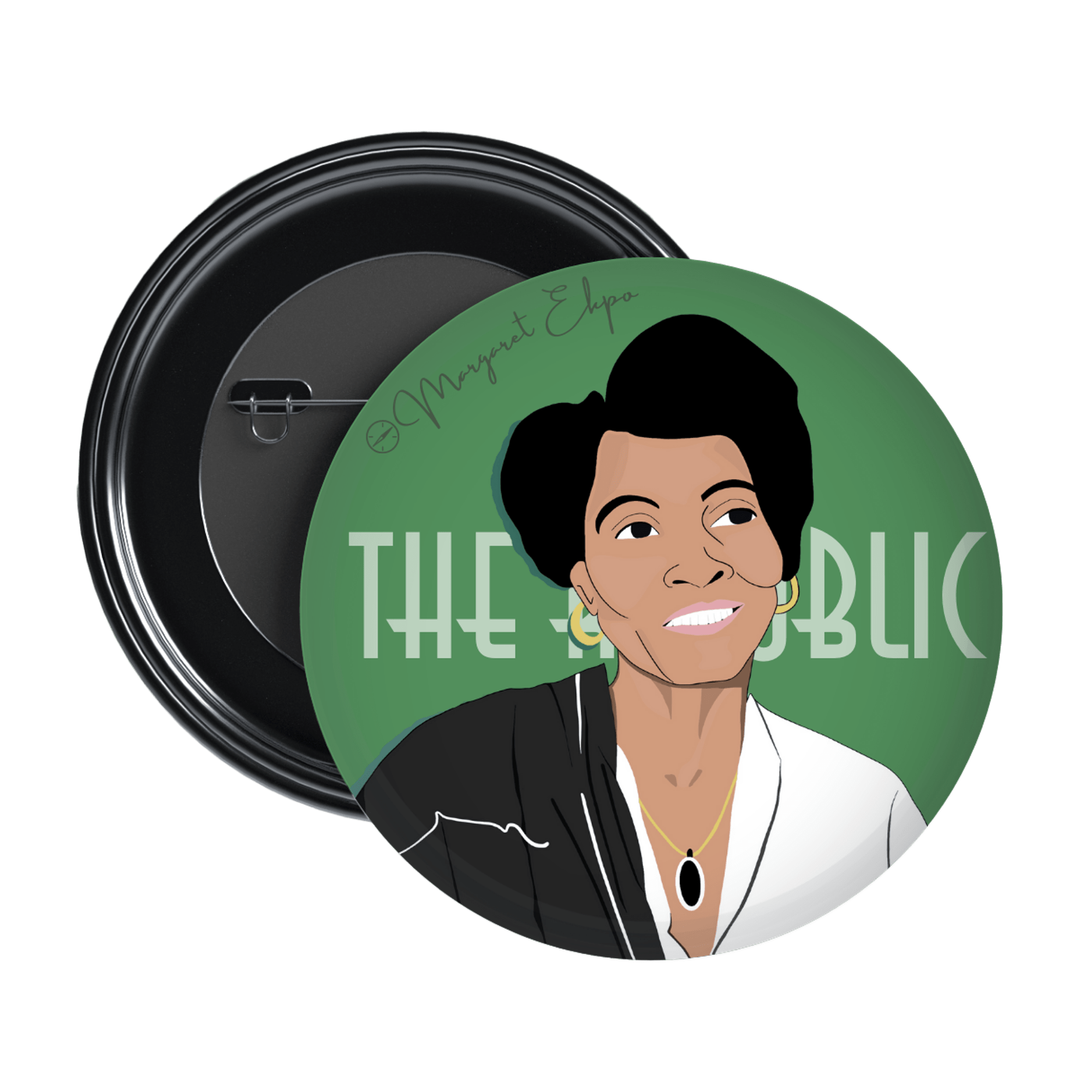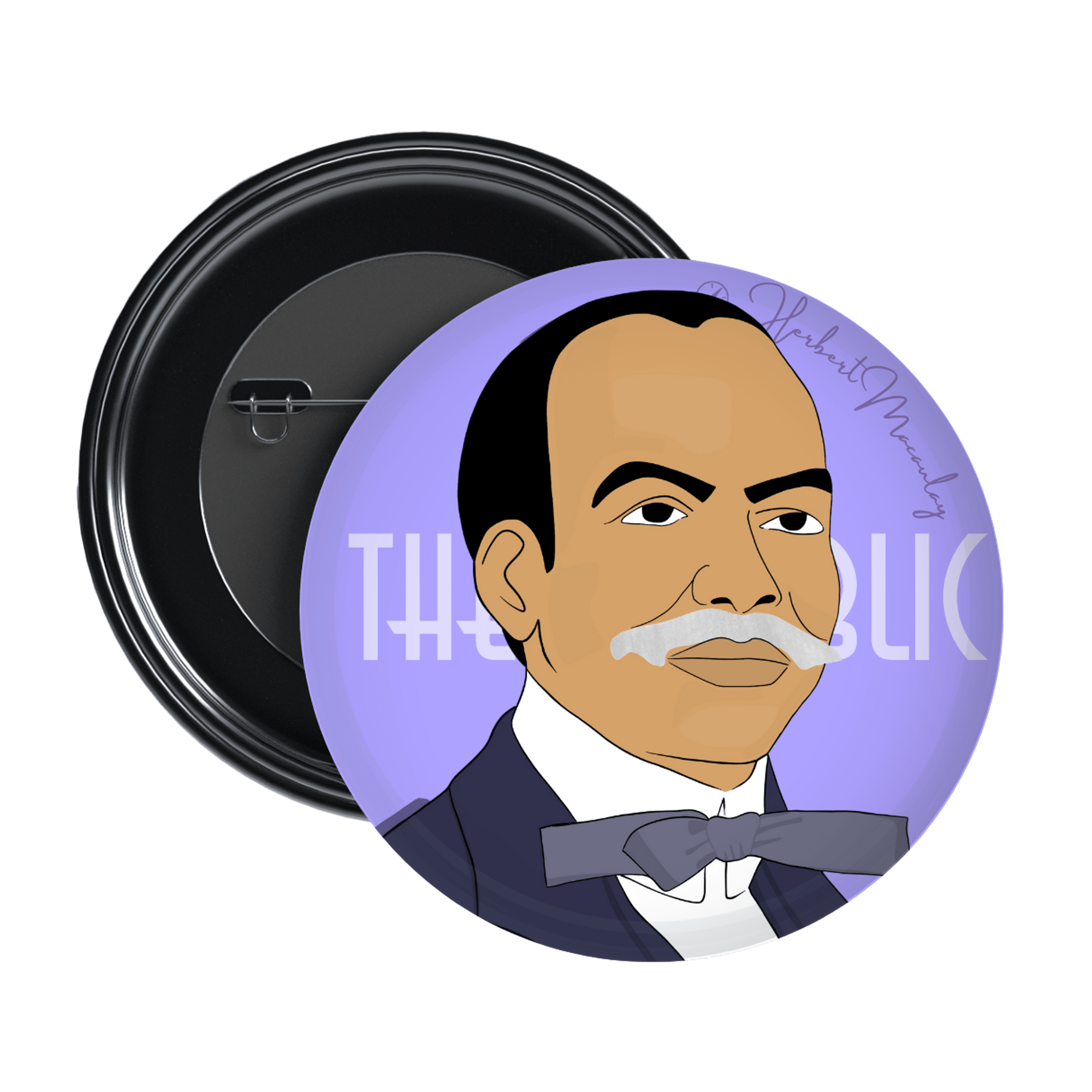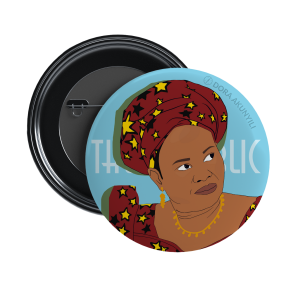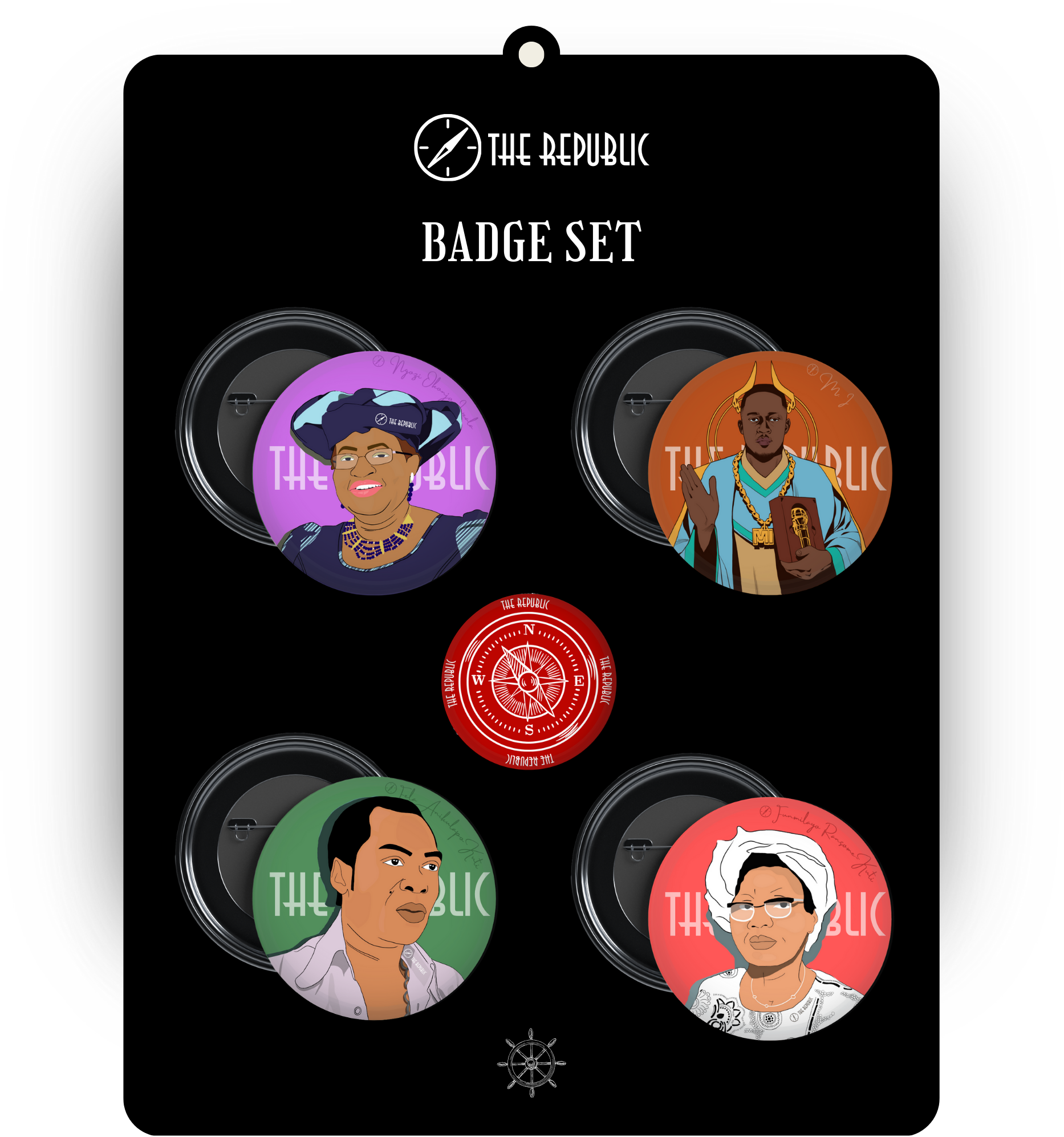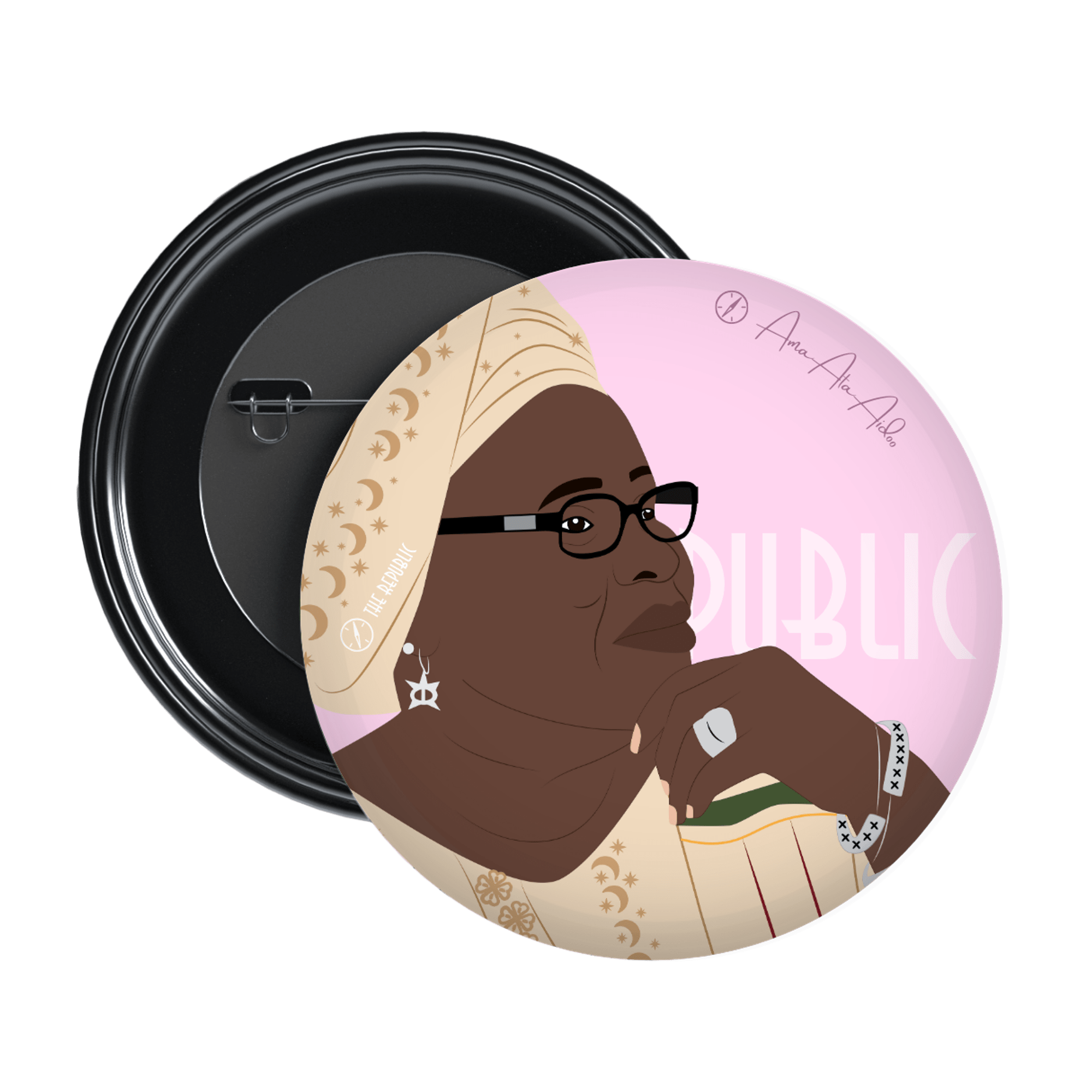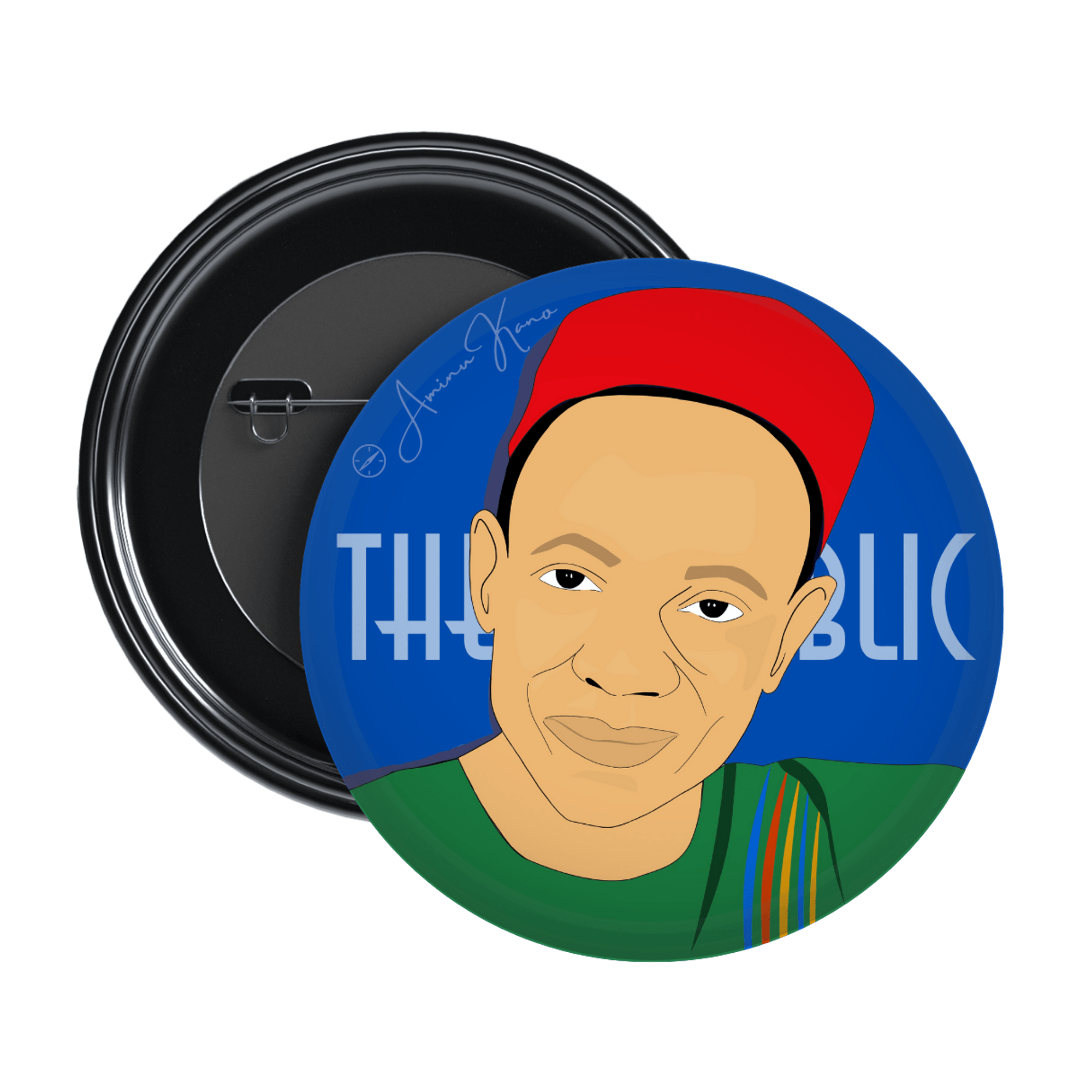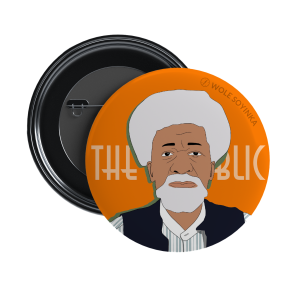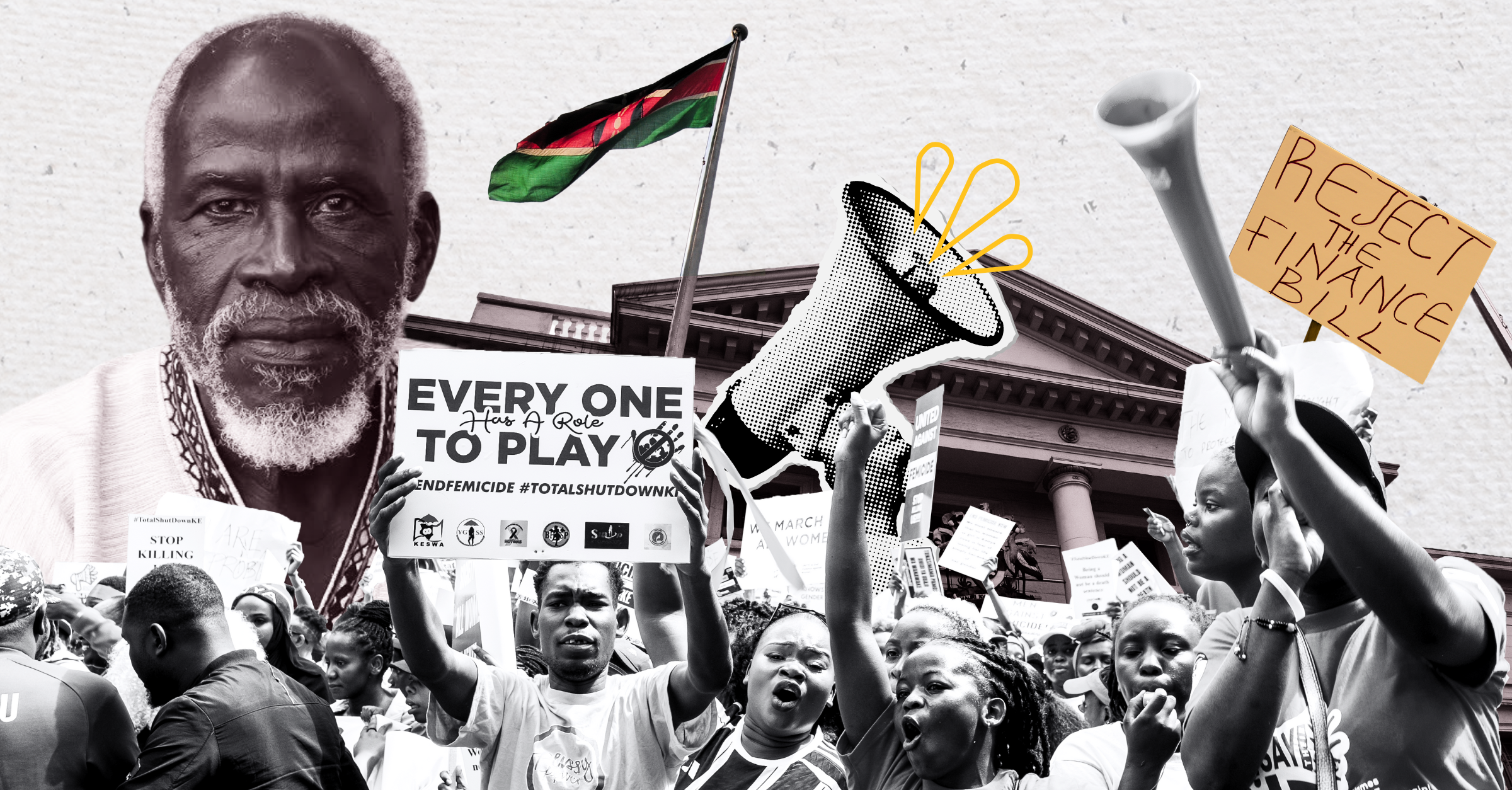
Collage by Dami Mojid for THE REPUBLIC. Source Ref: Photo 1 – South Sudanese writer, Professor Taban Lo Liyong / TABANLOYONG. Photo 2 – #TotalShutDownKE Femicide Protesters in Nairobi, Kenya, 2024. GEORGE MURIAMA / FLICKR.
DISPATCH FROM KENYA
Fiction as National Memory in the Age of Mass Protests

Collage by Dami Mojid for THE REPUBLIC. Source Ref: Photo 1 – South Sudanese writer, Professor Taban Lo Liyong / TABANLOYONG. Photo 2 – #TotalShutDownKE Femicide Protesters in Nairobi, Kenya, 2024. GEORGE MURIAMA / FLICKR.
DISPATCH FROM KENYA
Fiction as National Memory in the Age of Mass Protests
This essay features in our forthcoming print issue, ‘The Enduring Voice of Wole Soyinka’. Pre-order the magazine at our 20 per cent advance discount, here.
Kenya has no recollection of its past. Michela Wrong, mostly known for It’s Our Turn to Eat, in fact, posits in the 2009 book that Kenyans have been disallowed from looking into their past. The collective national psyche could be easily diagnosed as a case of historic amnesia, ‘blindspotting’ all the compounded experiences of what came before. If tradition really is the handing of all that is deemed worthy of handing over, the Kenyan man is an uncultured man, unearthed by any firm roots, a bobbing insular individual in this liquid modernity.
This lack of history could attribute an upside to it, that kind of inbred Kenyan exceptionalism in the spirit of our populace. That confounding positivity. There’s nothing that cannot be done for a Kenyan, and it’s exhilarating the frontiers that this has opened up. Kenyans excel tremendously compared to many African nations in matters of technology and have become one of Africa’s entrepreneurial mainstays.
But as documented, a lack of history infantilizes you. This lack of solid grounds to stand on has had us retreat in the first sense of conflict, back to our imagined communities, clutching onto tribal identities, making Kenya one of the most apparently ethnically divided nations.
This collective national-induced amnesia, in parts enforced by the colonial-based educational system; this manufactured national consciousness, is often so profound, awakened from it could easily tip our brittle democracy, and is what previously led to the unfortunate chapter of the 2007 post-election violence. To borrow the word of the late Wahome Mutahi’s influential column, ‘Whispers’, that for a bygone age was the throbbing lifeline of popular political consciousness, it is these whispers, these murmurs echoing of the past; when the population started invoking named like Tom Mboya again when the manifest discontent drove the country into the turmoil that led to our two previous presidents appearing before the International Criminal Court. It seems to serve our political elite’s best interest to protect us from this awakening. Since the beginning.
When independence was won and our founding father, Mzee Jomo Kenyatta, took his place as prime minister, all those who suffered colonial atrocities in Britain’s Gulag as Caroline Elkins would title her Pulitzer prize-winning book, expecting retribution and perhaps restitution for the colonial damages, Kenyatta would deliver a speech to the white settlers in equal measure to the one Nelson Mandela would give 30 years later, preaching forgiveness. The settlers, before that meeting expecting to be at the receiving end of the wrath of the new independent government, for the first time see a humanized individual, and shout out his praise in that hall, ‘Harambee!’ Kenyatta had before then been broadcasted all over Europe as the head and orchestrator of the savage acts of the Mau Mau, most prominently being the hacked child who became subject to the Nobel Prize-winning poet, Derek Walcott in his ‘A Far Cry from Africa’. He’d further be described by the colonial governor, Lord Baring, as the bearer of an intimidating gaze. This image was now sanitized for the masses, as he’d be cordially attending European living room through an hour-long interview on the BBC.
Since independence, it feels like the political class has been juggling between the preservation of this image upheld for the international observers, fogging whatever is happening at home, and Kenyans have had to come to terms with that reality. Kenyan writers have been grappling with these conflicting realities. To Kenyans, expecting some proportionate response to colonial collaborators, Kenyatta dismissively said, ‘We have all fought for Uhuru, let us now build the nation.’
That could sum up as the contradiction in the meritocracy of our system. This affirms what Ahmed Mohidin, author of African Socialism in Two Countries, said, ‘independence was granted on the basis of continuation of the system and not its destruction.’
I presume the status quo, the scales untipped is what bred that docility of the Kenyan spirit since the inception of the nation-state. In the early 2000s, while for the first time the air was euphoric with song of finally replacing the Moi regime, enforcer of the neoliberal standard adjustment programmes of the 1980s, the chorus, ‘Bila Moi, yote yawezekana. Without Moi, everything is possible,’ echoed in every corner of the country, the writer Michela Wrong still wrote of Kenya being this aspirational nation. Where the self-help section of their bookshops enjoys a disproportionately larger space compared to anything else. It was a muted populace. Its politics only acknowledged in lip service at newspaper vendors, the cries masked through humour; whether it’s about the new corruption scandal; the Goldenberg scandal of 1993 and the 2006 Anglo leasing scandal, it was never to the extent of calling for accountability from its political class. That was the order of things. What was apparent was the mass emasculation of its populace as it went about vocalizing discontent. What else was to be reaped in a society where fear was sowed; where its most important sounding boards, its writers had a long history of censorship and political imprisonment? Its first political prisoner was the Sauti ya Dhiki poet, Abdulatif Abdallah for his criticism of the Kenyatta regime, and most famously being Ngũgĩ wa Thiong’o. Writers were still being imprisoned in the decade when the dubbed bad boy of East African literature, Taban Lo Liyong, was calling out the region’s literary barrenness.
So, the recent historic protests have been a surprising turn of events in terms of their organization despite their lack of figureheads. Political analyst, Maryanne Nduati, describes it as a kind of euphoric violence filling the air that arises from letting out a long-restrained simmering discontent. That too from an often-dismissed generation; a generation described as severed from the national consciousness. The generationally changing education system has ensured that lack of continuity in stewardship. It’s rather radical. Those things worthy of being passed on can only be passed over, and all that remains is what these same young protesters say by themselves that informs their politics of this endemic system they find themselves in. It pays to listen to what informs the mass movement, and even better to listen to what they say is informing them; which is the political nature of the compulsory literatures examined in their national exams. They pride themselves as that generation that grew up reading Longhorn publishers’ books.
SOCIAL MEDIA AS THE CONTEXTUALIZING VEHICLE OF DISCONTENT
From the recent events of the #RejectFinanceBill2024, outsiders were served to the theatrics of the Kenyan Gen Z. They got to witness the flare, the pomp of outward displays as Kenyans took to the streets and then stormed and occupied parliament, but to Kenyans themselves, it’s the conversations that we’ve had as a nation as a result, conversations that had been left pending except for some fringe circles since independence, that we’ve had within these days that have had a long-lasting impression in the face of our democracy. We’ve collectively had conversations on where we want to go as a nation, which in the sense of continuity has brought about the interrogation of our past.
Kenya has since its inception enjoyed a disproportionate reverence in Africa, and that has mostly been through comparison with its dysfunctional neighbours. To paraphrase Michela Wrong, from the colonial infrastructure inherited were the network of roads, railways, a port and Jomo Kenyatta airport which services more airplanes in an afternoon than many African nations manage in a week. It could be said that Kenya didn’t fall into any of the darker manifestations of Africa. It has never been Uganda, where Idi Amin Dada and Apollo Milton Obote demonstrated how brutal post-colonial rule could turn; or Rwanda, mourning a genocide that left nearly a million dead; or Sudan, which has been home to one of the continent’s longest civil wars. Despite our ethnic divisions, we’ve never had Somalia’s feuding warlords. She says Kenya made the right choice in the Cold War lottery, allying itself with the winning, capitalist side. Kenya became the obvious place to train your soldiers, in the case of the British Army; to moor your warships, in the case of the Pentagon; to base your agencies, in the case of the United Nations; or to set up your Africa bureaux, in the case of Western television and radio stations. Kenya was comparatively stable and run by administrators that the Western world felt they could do business with. It presented an Africa they could stomach.
Kenya was the ideal neoliberal child that colonialism had always wanted. That image is quite unlikely at the moment with upheavals of protests going into their sixth week. There is however a mimetic quality to the protests. Not a week goes by without the administration doing something that a page of literature would make rounds in the X spaces that mirrors directly our reality. Mostly Kiswahili literature. Which in a comedic effect has led to the people speculating that the writers were prophets foretelling our future. But writers only capture the eternities in the time, the rhyming points of history, that a defiant few stood up to. In that regard, the books inventory a bygone age they were not privy to experience, the Moi age, when most freedoms were curtailed, and it has been through the application of these literary lenses that the Gen Z protests won’t bulge. All the administration’s playbook has been documented, revealing the William Samoei Ruto regime as unoriginal and more tyrannical than it dares admit it is. After all, he was forged on the crucible of the president responsible for the most suppression. The politicians now are not only viewed as archetypes but nicknamed and referenced by book characters from the recesses of our national memory.
When literature serves its function, radicalization is the call to action. For the masses to rise up as we inventory the past. Voicing the concerns of the working class as we imply some form of scrutiny of the demagoguery of the elite. This lifeline of the country has always been captured for a public that doesn’t read, in the books of Ngũgĩ, Grace Ogot and Meja Mwangi. Fictions that are splashing beyond our borders inform not only the East African condition but the human condition as well.
shop the republic
-
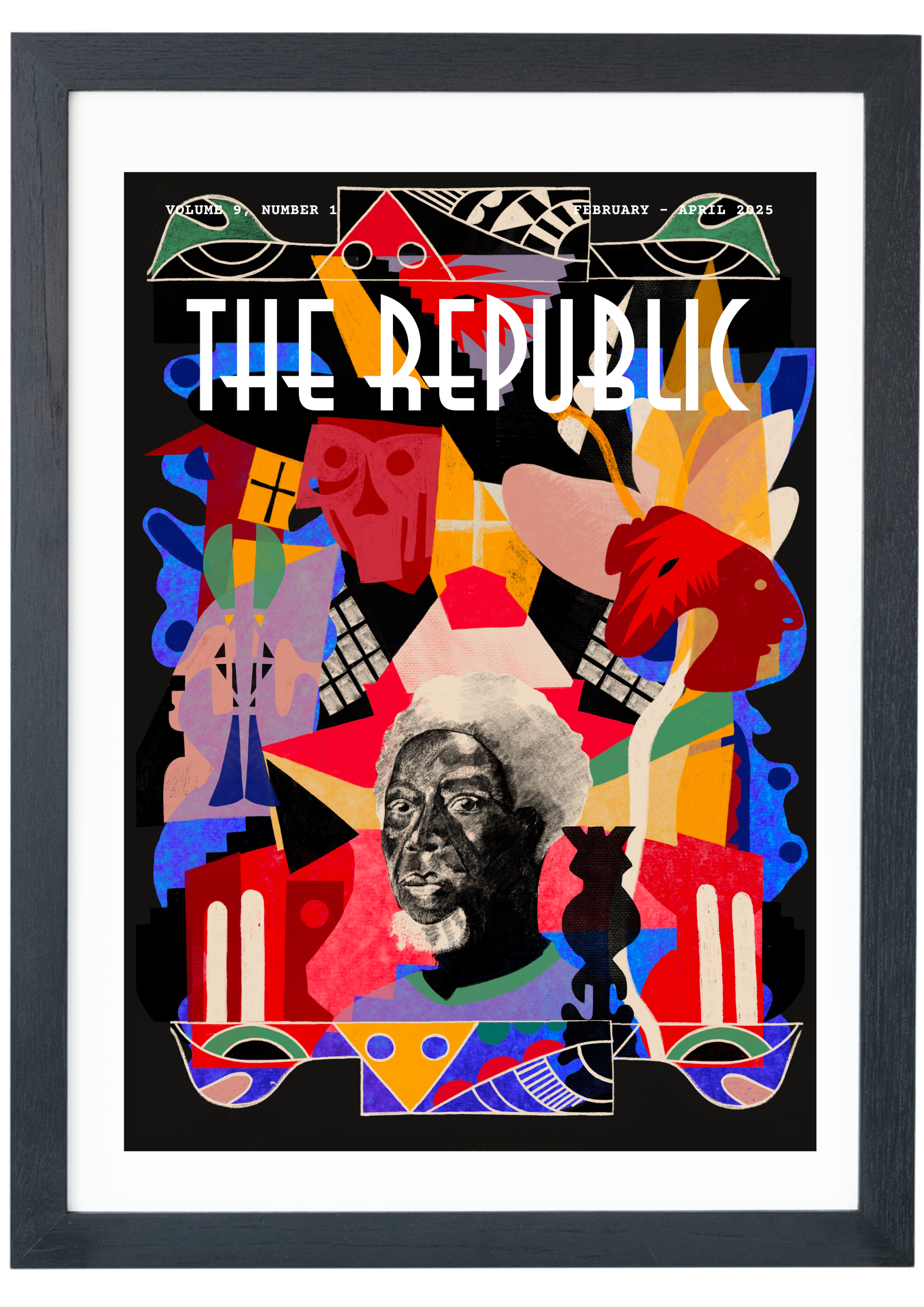
‘Natural Synthesis’ Print by Diana Ejaita
₦70,000.00 – ₦75,000.00 Select options This product has multiple variants. The options may be chosen on the product page -
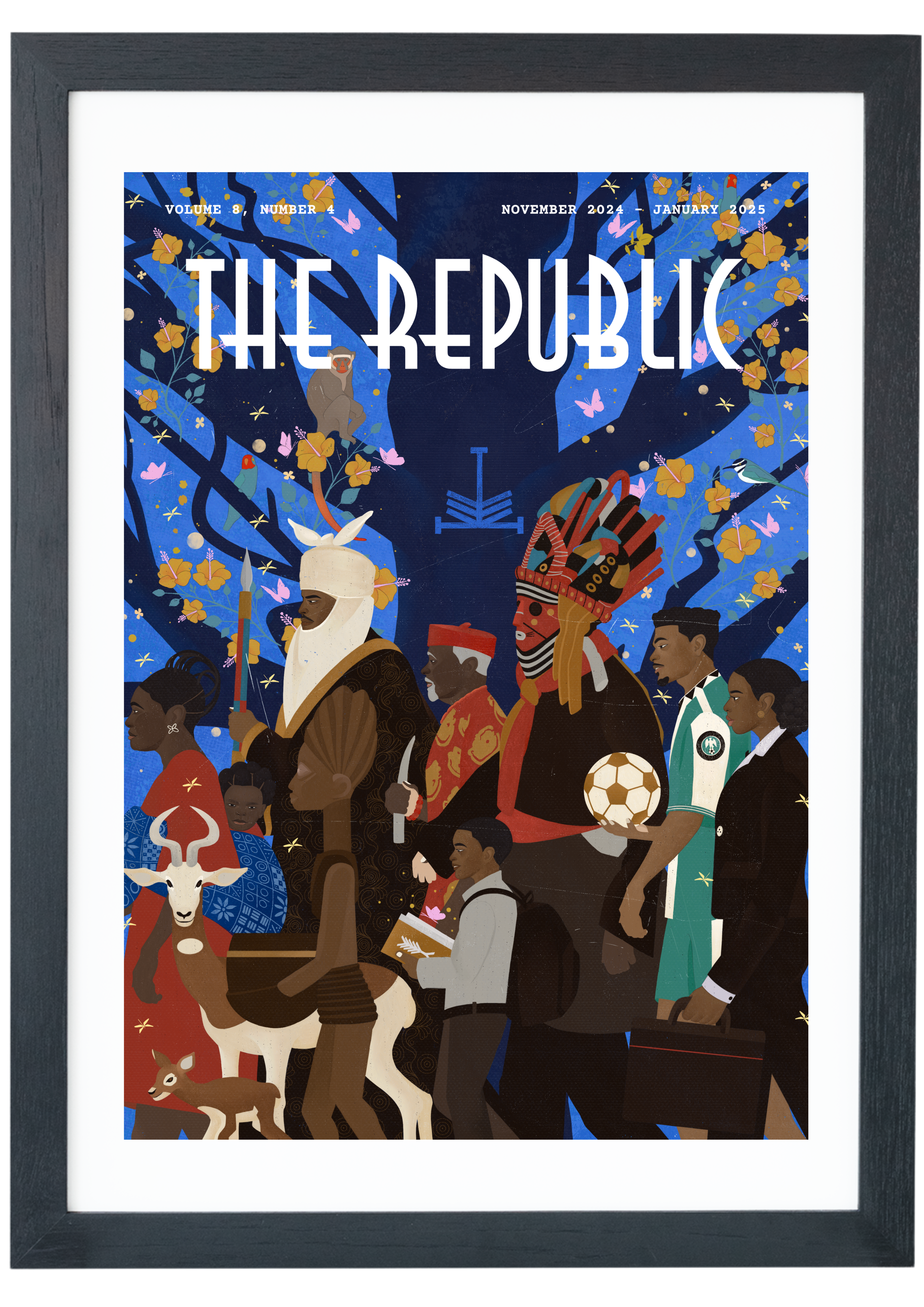
‘Homecoming’ Print by Shalom Ojo
₦70,000.00 – ₦75,000.00 Select options This product has multiple variants. The options may be chosen on the product page -
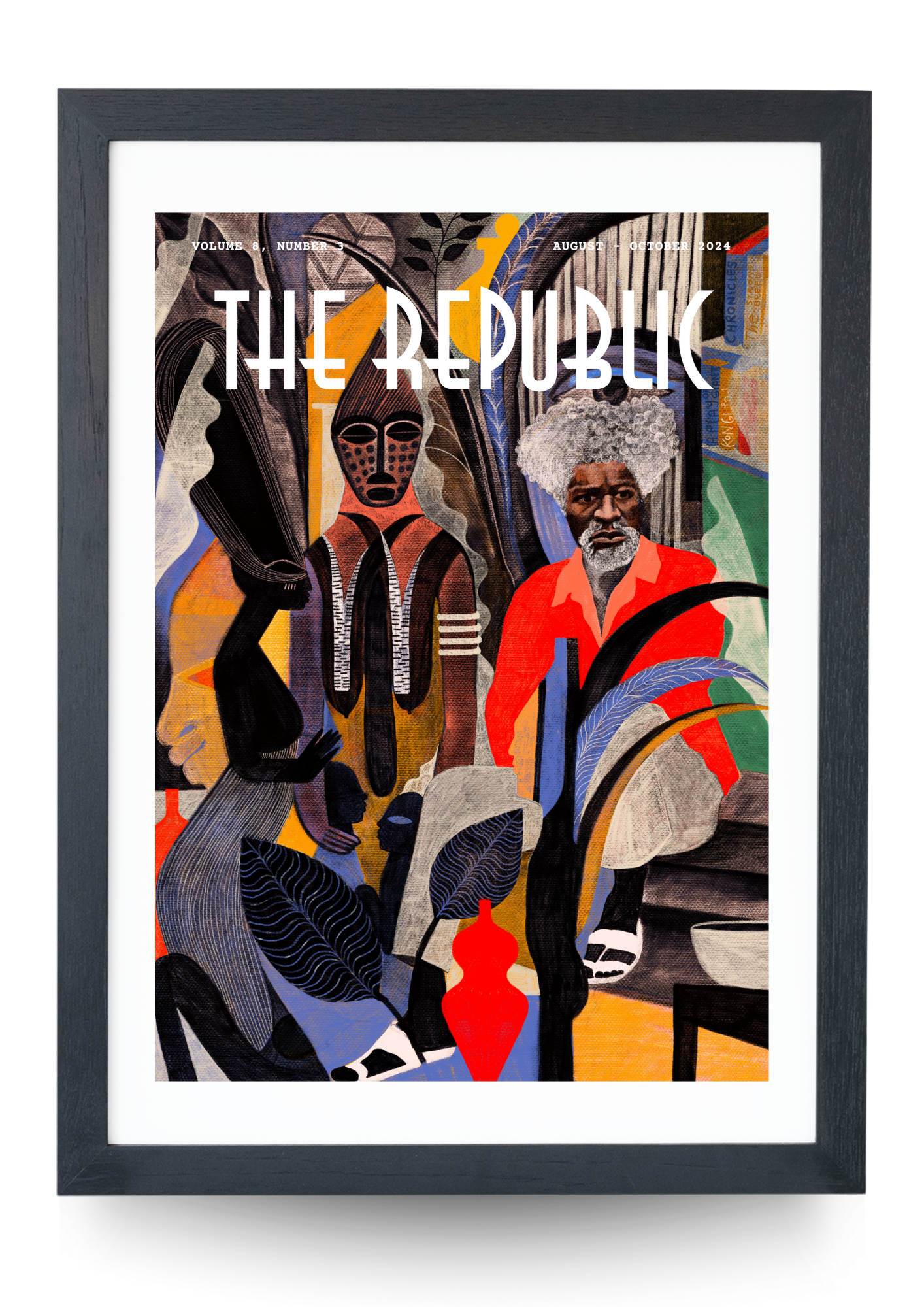
‘Kongi’s Harvest’ Print by Diana Ejaita.
₦70,000.00 – ₦75,000.00 Select options This product has multiple variants. The options may be chosen on the product page -
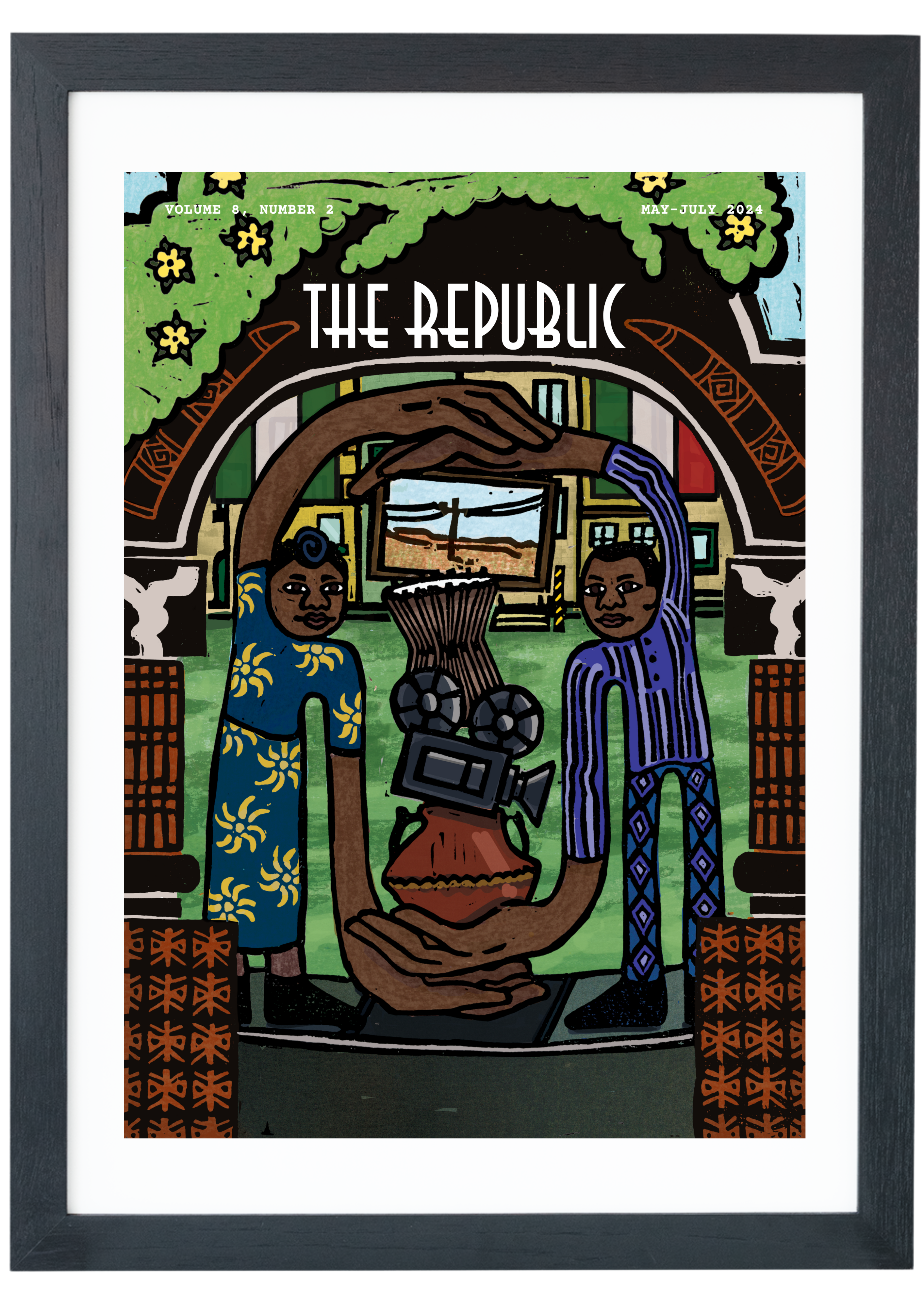
‘Welcome to Venice’ Print by Sarah N. Kanu.
₦140,000.00 – ₦150,000.00 Select options This product has multiple variants. The options may be chosen on the product page
shop the republic
-
 ₦70,000.00 – ₦75,000.00Select options This product has multiple variants. The options may be chosen on the product page
₦70,000.00 – ₦75,000.00Select options This product has multiple variants. The options may be chosen on the product page
KISWAHILI LITERATURE RALLYING THE MASSES
I’m thinking of Thomas Paine’s Common Sense and how it found the language to speak plainly to the common man, and I’m thinking of Malcolm X’s influence on the African American course. And if we are to equally supplant that into our society, the language of revolt should be one that speaks directly to the masses. The civil discontent can only yield to action conveyed through indigenous tongues. Hence the most cited books in the literary civil engagement: Kifo Kisimani, which enlightens the public on how to recognize state propaganda; Mstahiki Meya, where the government used to give holidays to the public so that they could forget their problems; and for the youngest batch of Gen Zs, they hail Kigogo; all politically charged books modelled after the Moi regime are in a language that speaks directly to the public.
That has been distinct for most of Swahili literature both in Kenya and Tanzania. The works of Ebrahim E. Hussein, Adam Shafii and Said A. Mohammed, all interweave popular history and encompass the betrayal of this dream of Uhuru, the perversion of religion as a tool to subjugate the working class and the tyranny enforced by the bourgeoisie. All of these works that have informed the Swahili public have been deeply political. Which could be said for their counterparts in English in the Heinemann African Writers series.
There could be no decolonization without epistemic sovereignty according to American professor, Joseph Lumbard. This is why critics as diverse as Kwame Anthony Appiah, Simon Gikandi and V.Y. Mudimbe contend that modern African literature emerged in the late 1950s and 1960s as a discourse designed to liberate African subjects from colonial tutelage, making a strong case for advocating the revival of dying indigenous systems of learning, literature in native languages and their intra-African translations. And where we cannot revive due to losses created through the destruction of these intangible cultures, the fiction and the stories we tell ourselves have become holy, and Africans as a whole have come to hold their writers in holy esteem, their fictions, even just the countercultures have taken the place of their national memory.
Rightly said, language carries with it its own idiosyncrasies. Inescapable. Hence the perpetrated thesis of the voice of the oppressed in the language of the oppressor is a boulder that we will be pushing up the decolonial hill for eternities. What we’re seeing with the protests is the literary lens through which the masses view their circumstances. We could employ foreign slogans but the solutions we seek, the understanding to get us there will only be carried by our own tongues. That’s why when Patsy Daniels writes, ‘Each writer must begin with a history inherited from the white, male, elite voices and revise it to include herself…’ that seems like a lot of work to just articulate the prescient matters of our democracy. A price of admission that begins with the writer first starting from a place of subservience to a ‘masterculture’.
Maybe in the distant past when the evaluation process for texts to be classified as elite or popular as George Ogola in his Popular Media in Kenyan History quotes the Tanzanian-based British writer Jane Bryce, ‘..was based on the evaluative procedures of the multinational publishers such as Heinemann, Longman and Macmillan,’ the issue of infrastructure was a huge caveat; but the barriers have been minimized and the market greatly democratized. This dream that the 1968 group of university lecturers had, Ngũgĩ, Liyong and the University of Nairobi team, the emphasis on the need for reinvention and revival of Africa’s cultural past to help address some of the emerging challenges in independent Kenya is becoming a reality. This has been the case since the emergence of Kwani? in the early 2000s, producing an influx of Kenyan voices speaking to the issues of our time, to the age of Lolwe where we address African literature as a singularity, amplifying public dissatisfaction in real-time. But what of this domestic literature that we ourselves issue the price of admission?
shop the republic
-
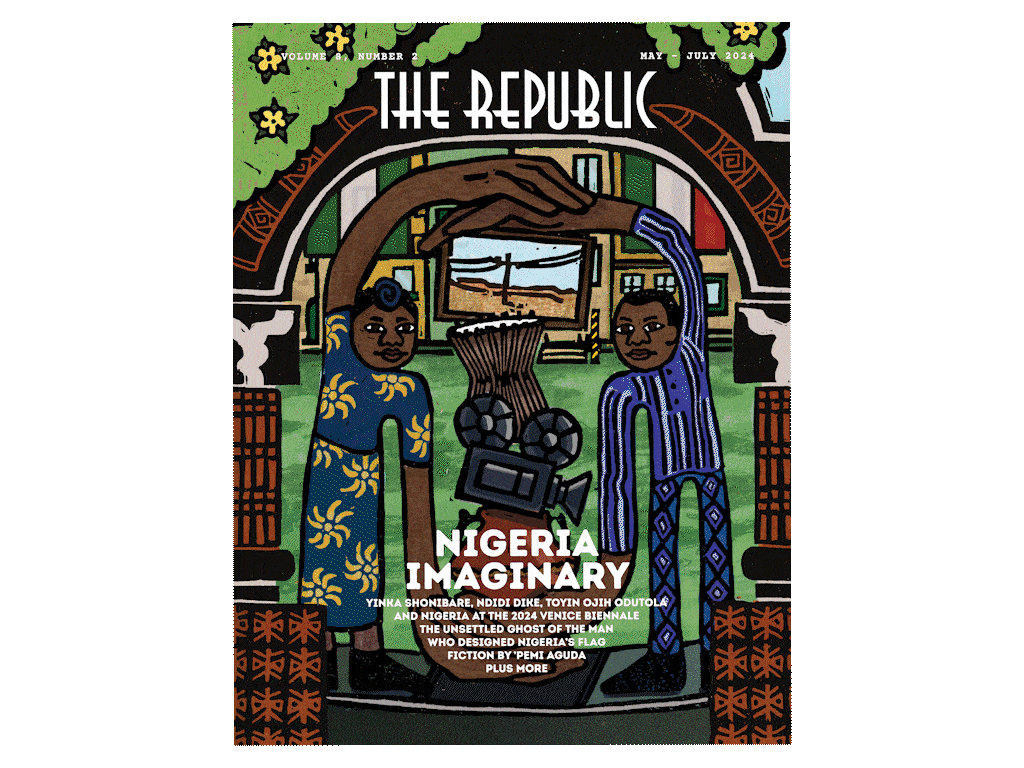 ₦20,000.00 – ₦60,000.00Select options This product has multiple variants. The options may be chosen on the product page
₦20,000.00 – ₦60,000.00Select options This product has multiple variants. The options may be chosen on the product page
shop the republic
AFRICAN LITERATURE IN LIQUID MODERNITY
The question always asked is why does an African writer write? Why include himself as a subject of history he’s constantly being erased from? Well, it could be for the sake of identity. To establish an independent postcolonial identity. I still might argue from Ngũgĩ’s standpoint that to pick a language is to pick your audience. Even despite the objectiveness applied in your subject, we write bound by the tradition of the language. This is why the budding infrastructures of indigenous languages like the Safal-Cornel Swahili Prize are so important right now in cultivating indigenous philosophies and speaking directly to us as Africans.
I realize that despite our many languages, our plight is a very African plight, and it pays to look at the whole of African literature as a monolith. We’re all punching up against hegemony, empirical dominance and forcefully inserting ourselves as primary sources. In the Wretched of the Earth, Frantz Fanon addresses the question of national culture:
The artist who has decided to paradoxically toward the past and away from actual events. What he ultimately intends to embrace are in fact the castoffs of thought, its shells and corpses, a knowledge which has been stabilized once and for all. But the native intellectual who wishes to create an authentic work of art must realize that the truths of a nation are in the first place its realities. He must go until he has found the seething pot out of which the learning of the future will emerge.
So the African writer has always been a curator of his past, of his culture, and we speak of culture in Zygmunt Bauman’s sense, the highest ideals that we should strive towards as a society, and with the budding infrastructure of literary magazines like down river road, Makena Onjerika’s Nairobi Writing Workshop, the brilliant work by African Writers Trust and Dagoretti Kyomuhendo, we are creating the fertile grounds for the ‘inventorists’, and I wouldn’t be surprised to find that most submissions to prizes from Kenya would surround the protests and the subjects of political discontent. Mirroring a time prior when an influx of the same literature that informs us now.
Young Africans seem adamant about overcoming the inequitableness of publishing through these many workarounds, disrupting, archiving and championing the culture. And in other places, translation is becoming a stand-in for the language.
There’s a dismissible article I read some time back on the Kenyan political elite saying that this leaning of Kenyans now more than ever towards useless subjects like the arts hampers our competitive advantage on the world labour pool. But we have these conversations in our spaces now of how these same useless subjects are the drivers of national conversations. Art is only important because of its uselessness, its seeming lack of utility, and inadmissibly, with the kind of mass civil education we’ve witnessed, even in terms of translation of the national dialogue in all tongues so that no one gets left behind, now more than ever when we’re no longer enamoured by the West, and while we have the young’s attention, we need to go back to our literature, the Ngũgĩs, Gurnahs, the Ogots, the Owuors, Salihs, Marecheras and Kimanis and the canonical writers who lie at the heart of the national consciousness to shine the light ahead; to pick on from this repository of our compounded memory⎈
shop the republic
BUY THE MAGAZINE AND/OR THE COVER
-
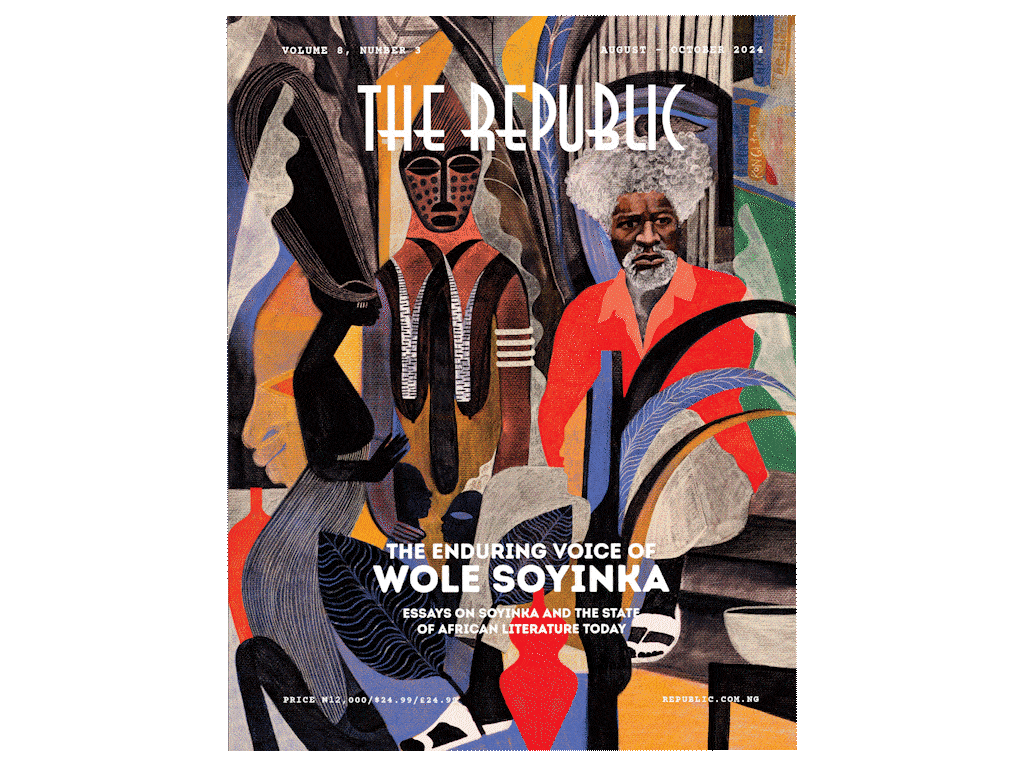
The Republic V8, N3 The Enduring Voice of Wole Soyinka
₦24,000.00 Buy Now -

‘Kongi’s Harvest’ Print by Diana Ejaita.
₦70,000.00 – ₦75,000.00 Select options This product has multiple variants. The options may be chosen on the product page




